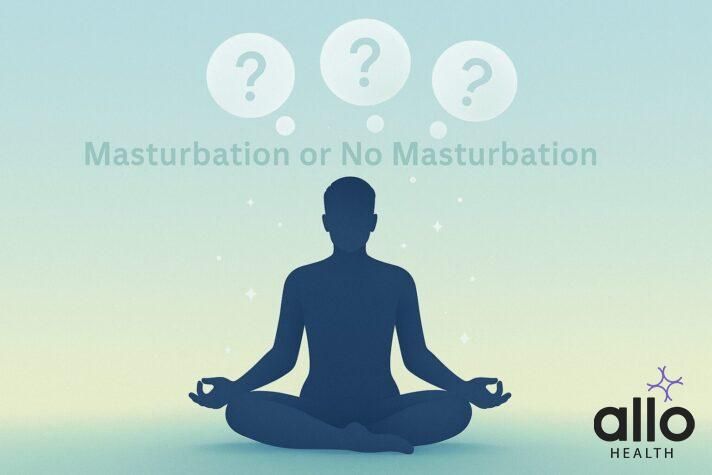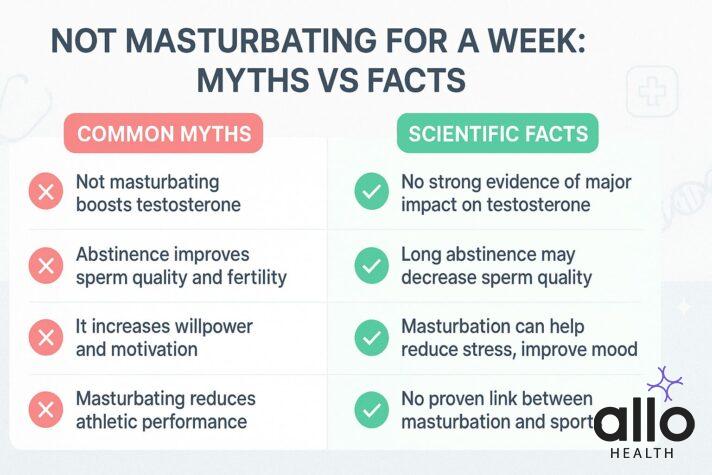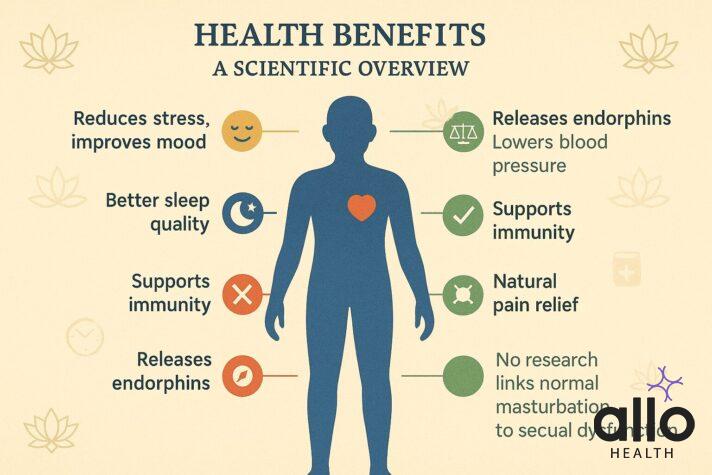Not Masturbating for a Week
Written by Dr. Deepali Anand

Dr. Deepali is a medical writer and healthcare professional with a background in clinical surgery and patient care. Having transitioned from active clinical practice to medical communications, she specializes in bridging the gap between complex clinical data and patient education. Dr. Deepali is dedicated to creating evidence-based content that is grounded in scientific rigor and empathy, ensuring that sensitive topics like sexual wellness and mental health are accessible and empowering for every reader.
•
June 20, 2025
Our experts continually monitor the health and wellness space, and we update our articles when new information becomes available.

Quick Read
The "week without masturbation" trend, often linked to NoFap and No Nut November, claims benefits like boosted testosterone, better focus, and improved sexual health. But current scientific evidence does not strongly support these claims. Most of the reported benefits are anecdotal, while regular masturbation actually offers proven advantages for sexual, mental, and overall health. That said, if masturbation becomes compulsive or tied to pornography addiction, it may negatively affect daily life. Ultimately, whether to masturbate or abstain is a personal choice, and if done for health reasons, it’s always wise to consult a doctor.
Is taking a break from masturbation really a game-changer for your health? Many people are curious whether not masturbating (abstinence) for a week can boost testosterone, sharpen focus, or transform their sex lives. The truth? There’s no magic in abstinence.
In this article, we’ll break down where this trend started and, most importantly, what science really says about all these claims. We'll also discover the real benefits of masturbation, clear up common myths, and learn how to make the best choice for our own body and mind. Let’s dive in with facts, not fads.
What is The Week Without Masturbation Trend?
Where does this 7-day abstinence period challenge come from? Well, it all started when a group of people on an online forum known as Reddit started the "NoFap movement" and built it into a community. The NoFap community describes itself as a peer support group for porn addiction and compulsive sexual behavior recovery. Let's dive deeper.
Exploring the NoFap Movement
The term "NoFap" comes from internet slang term "fap" - a casual word for masturbation. The whole thing started back in 2011 on Reddit, when a group of users discussed a study that showed a possible spike in testosterone after about 7 days of no masturbation. That simple conversation sparked a huge movement.
Since then, NoFap has evolved into a large online community with dedicated websites, forums, and official challenges where people support each other through periods of abstinence lasting days, weeks, or months. The movement has become so significant that "NoFap" is now a registered trademark and full-fledged brand.
The participants call themselves "Fapstronauts", they take up challenges to avoid porn, masturbation and any form of sexual pleasure for a certain period of time which can range from 7 days, 30 days or to even upto half a year. The idea is that controlling compulsive masturbation can increase energy and motivation for other life areas. For many, it represents more than just quitting masturbation: it's about developing self-control, discipline, mental clarity, and personal growth.
Not Masturbating for a Week: Myths VS Facts

The supposed positive effects of not masturbating that the NoFap community propagates are:
- Increased testosterone level:
Myth:
The Nofap community and their fans claim that following the abstinence period, the level of testosterone in the body is increased. What is testosterone? It is the male sex hormone that plays a major role in growth, strength, fertility, and sexual health.
This potential benefit of increased testosterone production after an abstinence period was backed by a very small study[1] (which is now retracted) conducted on 28 men, in which they claimed that after an abstinence period of 7 days, the serum testosterone levels increased by 150%.
They also attached the proof of another very small study[2] conducted on 10 men in which the testosterone level increased after an abstinence period of 3 weeks .
Fact:
These studies that are used to back the claim of an increase in testosterone level have major limitations, which make them unreliable. These are:
- Extremely small sample sizes (10-28 participants)
- One key study used for the claim has been retracted
- Results haven't been replicated in larger, more rigorous studies
Many newer studies [3]disagree with these earlier studies. According to them, the link between masturbation and testosterone levels is very doubtful. For example, one study[4] has shown that testosterone levels increase during masturbation and sex and then fall back to normal.
The simple fact here is that there isn’t enough evidence or research on humans, or in general, to support the negative effects of masturbating or sexual activity on testosterone levels in the body. While there may be temporary or short-term changes, no strong scientific evidence supports any major long-term impact.
- Improved sexual health and sperm health:
Myth:
Another common misconception is that masturbation harms sperm health and leads to infertility. The idea is that, higher the abstinence period, the more sperm volume, concentration, and quality you build up. Some people in the NoFap community also believe that not masturbating can improve issues like erectile dysfunction and premature ejaculation over time.
Fact:
Studies[5] show that sexual abstinence can increase the sperm concentration and volume, but on the other hand, it decreases the speed(sperm motility) and zest(vitality)of sperm. Along with this, a longer abstinence period can cause DNA damage in the sperm, further reducing the human sperm quality.
When it comes to treating erectile dysfunction and premature ejaculation, there is no research on the link between masturbation[6] and erectile dysfunction or premature ejaculation. But it also important to know that, excessive masturbation to the level of injury to the penis can cause difficulty in getting an erection.
- Increased willpower, mood, and motivation:
Myth:
Some believe that not masturbating boosts mental clarity, focus, productivity, energy level, and even athletic performance- an idea that’s been around for ages. Some men also say that they feel more dedicated, clear-headed, happier, and less stressed during the abstinence period.
Fact:
Interestingly, research often points in the opposite direction. Masturbation can actually help reduce stress, improve mood, and promote relaxation. For people with a higher sex drive, avoiding masturbation might even make it harder to focus or stay productive. As for athletic[7] performance, studies haven't found any strong link between masturbation and a drop in physical performance.
That said, if masturbation ever leads to feelings of guilt or anxiety, it’s always better to address those emotions directly.
Movements like NoFap are often driven more by personal experiences than scientific facts. It’s important to separate community stories from what research actually tells us about masturbation and health.
Benefits of Masturbation

All the myths, taboos, and shame around masturbation can easily confuse us and make us wonder, What’s so wrong with masturbation in the first place. The reality is, masturbation offers several important benefits- not just for daily life, but also for our sexual health and well-being.
Let’s explore how masturbation can actually support a healthy sex life.
Sexual Health Benefit:
Category
Benefits
General Benefits (For All Genders)
- Safe sex practice: no pregnancy risk, lower STI risk (mutual masturbation)
- Releases sexual tension
- Helps explore personal sexuality and preferences
- Builds confidence to communicate desires and sexual satisfaction in a relationship.
- Supports management of sexual dysfunction (e.g., premature ejaculation, orgasm difficulties)
- Encourages comfort with one’s body, sexual expression, and boundaries
Men-Specific Benefits
- May reduce the risk of prostate cancer[8] and relieve symptoms of blue balls[9] (epididymal hypertension) by frequent ejaculation
- Supports long-term prostate and reproductive health
Women -Specific Benefits
- Increases the likelihood of orgasm during partnered sex
- Relieves menstrual cramps
- Reduces vaginal dryness, especially with age
- Boosts self-esteem, sexual desire, and relationship satisfaction
- Helps relieve pregnancy-related discomfort like back pain and tension
General Health Benefits:
Benefit Area
How Masturbation Helps
Relaxation & Sleep
Helps you fall asleep faster and better by releasing oxytocin and endorphins, which relax the body and reduce stress. Studies[10] even show that orgasms before sleep can improve sleep quality.
Hormonal Benefits
Orgasms release dopamine and oxytocin - the happy hormones, which balance cortisol, a stress hormone.
Mental Health
Reduces stress, tension, lowers blood pressure[11], boosts mood, focus, confidence, and happiness.
Pain Relief
Helps reduce minor aches and pains because it releases endorphins, which are feel-good chemicals that block pain signals in the brain.
Immune System
Supports a healthy immune system[12] function.
Diabetes type 2
It may help lower the risk of type 2 diabetes by reducing stress (lowering cortisol), improving sleep (which supports healthy blood sugar levels), and boosting overall health through better mood and immune function.
It is also important to know that not ejaculating for a long time isn't harmful and has no known serious physical or psychological risks. The body naturally reabsorbs unused sperm , and while some may feel temporary discomfort like "blue balls," it usually resolves on its own.
The Big Question: Is Masturbation a Good or a Bad Practice?
Masturbation is a personal choice. There is nothing majorly good, but definitely nothing bad, with masturbation. Whether your masturbation sessions range from once a day, once a week, or never, it is and should always be your own choice.
We have now debunked all the myths and know that most of the positive effects of No Nut November and NoFap are mostly anecdotal, with no strong scientific backing. Regular masturbation is actually good for a healthy sex life and can contribute to an overall good quality of life. But it’s important to watch out for compulsive masturbation and pornography addiction, as these can negatively affect you, your relationships, and your social life.
So, if you choose to stop masturbating for a while, let it be your decision, not because you believe it will magically transform you, and if you're planning abstinence for health reasons, it's always smart to have a quick chat with your doctor to make an informed decision.
Disclaimer
The following blog article provides general information and insights on various topics. However, it is important to note that the information presented is not intended as professional advice in any specific field or area. The content of this blog is for general educational and informational purposes only. The content should not be interpreted as endorsement, recommendation, or guarantee of any product, service, or information mentioned. Readers are solely responsible for the decisions and actions they take based on the information provided in this blog. It is essential to exercise individual judgment, critical thinking, and personal responsibility when applying or implementing any information or suggestions discussed in the blog.
Most Asked Questions
What will happen if I don't masturbate for a week?
For most people, not masturbating for a week won’t lead to any major physical changes. You might notice temporary changes in mood, energy, or sexual desire, but there’s no strong scientific proof that short-term abstinence leads to long-term health benefits.
Does not ejaculating for 7 days increase testosterone?
Some small studies have suggested temporary changes, but there is no strong scientific evidence showing that not masturbating increases testosterone levels long-term.
Is masturbation safe if I have a high sex drive?
Yes, even with a high sex drive, masturbation is safe as long as it’s not interfering with your daily life or causing physical discomfort. Listening to your body is important.
Can masturbation become harmful if done too much?
Masturbation is safe for most people. But if it becomes compulsive or interferes with daily life, relationships, or work, it may be helpful to seek support from a doctor or therapist.
Does not masturbating help with erectile dysfunction or premature ejaculation?
There’s no solid evidence that abstaining from masturbation treats erectile dysfunction or premature ejaculation. But, compulsive or rough masturbation may sometimes contribute to temporary issues.
Sources
- 1.
A research on the relationship between ejaculation and serum testosterone level in men
- 2.
Endocrine response to masturbation-induced orgasm in healthy men following a 3-week sexual abstinence
- 3.
Hormonal response after masturbation in young healthy men – a randomized controlled cross-over pilot study
- 4.
Hormonal response after masturbation in young healthy men – a randomized controlled cross-over pilot study
- 5.
Influence of the abstinence period on human sperm quality: analysis of 2,458 semen samples
- 6.
Do pornography use and masturbation play a role in erectile dysfunction and relationship satisfaction in men?
- 7.
The influence of sexual activity on athletic performance: a systematic review and meta-analyses
- 8.
Frequent ejaculation may be linked to decreased risk of prostate cancer
- 9.
“Blue balls” and sexual coercion: a survey study of genitopelvic pain after sexual arousal without orgasm and its implications for sexual advances
- 10.
PD28-11 O TO ZZZ's: INVESTIGATING THE RELATIONSHIP BETWEEN ORGASM AND SLEEP QUALITY IN WOMEN
- 11.
Sexual Activity and Cardiovascular Disease: A Scientific Statement From the American Heart Association
- 12.
Effects of sexual arousal on lymphocyte subset circulation and cytokine production in man
Why Should You Trust Us?
Why Should You Trust Us?
This article was written by Dr. Deepali Anand, who has more than 1 years of experience in the healthcare industry.
Allo has the expertise of over 50+ doctors who have treated more than 1.5 lakh patients both online and offline across 30+ clinics.
Our mission is to provide reliable, accurate, and practical health information to help you make informed decisions.
For This Article
- We reviewed over 25 top-ranking articles and medical resources on masturbation, NoFap, and sexual health to ensure our content is current, accurate, and reliable.
- We analyzed multiple peer-reviewed research papers and scientific studies related to masturbation, testosterone levels, sperm health, mental well-being, and sexual function.
- We explored online forums such as Reddit (NoFap community) and Quora to understand real user experiences, concerns, and commonly asked questions.
- We monitored social media discussions across YouTube, Twitter, Instagram, and Facebook to identify trending claims, viral challenges (like No Nut November), and public misconceptions.
- We cross-referenced authoritative health sources, including the Mayo Clinic, NHS, Cleveland Clinic, and peer-reviewed journals for accurate medical information.
- We consulted sexual health expert opinions to provide clear, balanced, and actionable information - free from myths, fear, or judgment.


